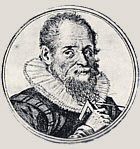Physicists, astronomers, architects, geometricians, mathematicians, chronometer-makers, watchmakers: these are just some of the interested people who, through the years, have displayed a passion for the measurement of time. Their research led to major discoveries and inventions that are still relevant today. Whether physical or geometrical theories, natural laws or mechanical applications, their fundamental contributions have all made it possible to measure time with greater accuracy, to create timepieces to ever higher specifications while allowing aesthetic qualities to become more refined, and even to design increasingly efficient and modern production methods.

Jost Bürgi
(1552 - 1632)
Swiss horologist, astronomer and mathematician, he was employed as a mechanic by the Margrave William IV of Hesse-Cassel, then as clockmaker to the Emperor Rudolph II. He built many clocks, globes and other apparatus. For William IV, who was a talented astronomer, he made astronomical instruments and used them for making observations. Later, he worked with Kepler at Prague and, independently of Napier, compiled a table of logarithms.


 Knowledge
Knowledge